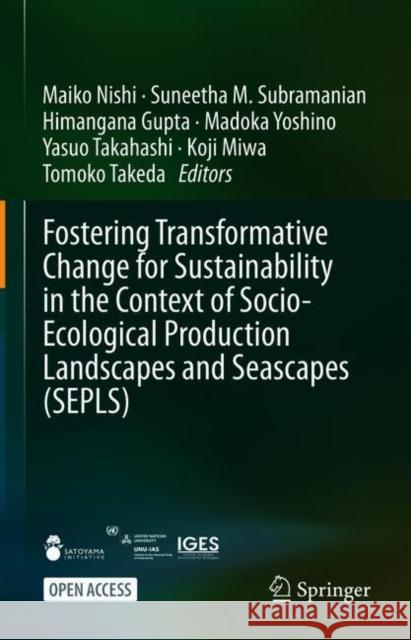Fostering Transformative Change for Sustainability in the Context of Socio-Ecological Production Landscapes and Seascapes (Sepls) » książka



Fostering Transformative Change for Sustainability in the Context of Socio-Ecological Production Landscapes and Seascapes (Sepls)
ISBN-13: 9789813367609 / Angielski / Twarda / 2021 / 249 str.
Fostering Transformative Change for Sustainability in the Context of Socio-Ecological Production Landscapes and Seascapes (Sepls)
ISBN-13: 9789813367609 / Angielski / Twarda / 2021 / 249 str.
(netto: 192,11 VAT: 5%)
Najniższa cena z 30 dni: 192,74
ok. 22 dni roboczych.
Darmowa dostawa!
Foreword.- Preface.- Chapter 1. Introduction.- Chapter 2. Reconciling community livelihood needs and biodiversity conservation in Taita Hills forests for improved livelihoods and transformational management of the landscape.- Chapter 3. Degraded landscape transformed into foodland and woodland by village agroforestry.- Chapter 4. Long-term tracking of multiple benefits of participatory forest restoration in marginal cultural landscapes in Himalaya.- Chapter 5. Social-ecological transformation through planting mixed tree species on abandoned agricultural land in the hills of Nepal.- Chapter 6. Transformative change through ecological consumption and production of ancient wheat varieties in Tuscany, Italy.- Chapter 7. Sustainable rural development and water resources management on a hilly landscape: A case study of Gonglaoping community, Taichung, ROC (Chinese Taipei).- Chapter 8. Transformative change in peri-urban SEPLS and green infrastructure strategies: An analysis from the local to the regional scales in Galicia (NW Spain).- Chapter 9. Water with Integrated Local Delivery (WILD) for transformative change in socio-ecological management.- Chapter 10. Traditional landscape appropriation of Afro-descendants and collective titling in the Colombian Pacific region: lessons for a transformative change.- Chapter 11. Climate change resiliency through mangrove conservation: the case of Alitas farmers of Infanta, Philippines.- Chapter 12. Improvement of human and environmental health through waste management in Antigua and Barbuda.- Chapter 13. Synthesis: Conception, approaches and strategies for transformative.
This open access book is a compilation of case studies that provide useful knowledge and lessons that derive from on-the-ground activities and contribute to policy recommendations, focusing on the relevance of social-ecological production landscapes and seascapes (SEPLS) to “transformative change.” The concept of “transformative change” has been gaining more attention to deal with today’s environmental and development problems, whereas both policy and scientific communities have been increasingly calling for transformative change toward sustainable society. The Intergovernmental Science-Policy Platform on Biodiversity and Ecosystem Services (IPBES) has planned to start the so-called “assessment on transformative change” if approved by the IPBES plenary to be held in 2021. At present, the idea of transformative change, including its scope, methodologies, approaches and strategies, are yet to be clarified. By bringing together all of the different concerns and interests in the land/seascape, SEPLS approaches could provide practical and experience-based insights for understanding and gauging transformative change and identifying determinants of such change. This book explores how SEPLS management relates to the idea of transformative change to further the discussion of sustainable transitions in advancing sustainability science. The introductory chapter is followed by case study chapters offering real-world examples of transformative change as well as a synthesis chapter clarifying the relevance of the case study findings to policy and academic discussions. It will be of interest to scholars, policymakers and professionals in the fields related to sustainable development.
1997-2026 DolnySlask.com Agencja Internetowa
KrainaKsiazek.PL - Księgarnia Internetowa









